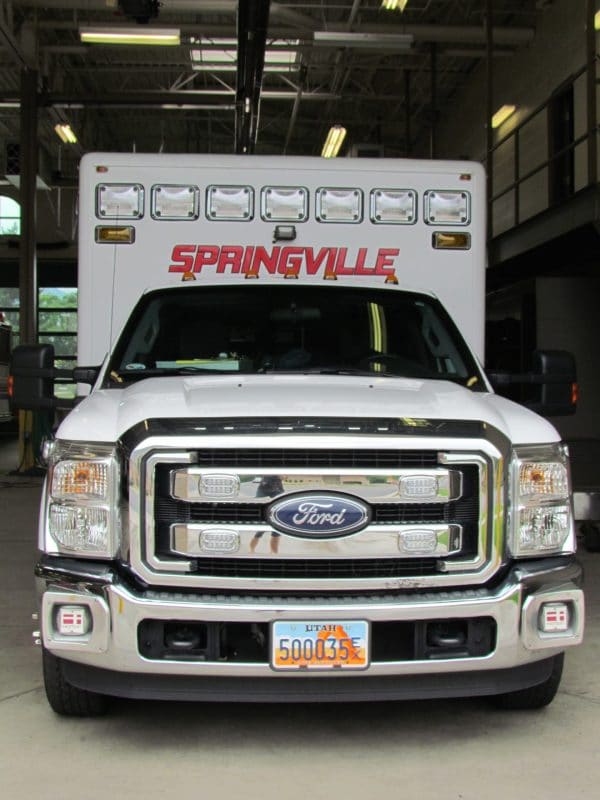Table of Contents
Should You Call?
Chief Henry Clinton of the Springville Fire and Rescue has seen a lot of emergencies in his career. He has seen it all from people calling ambulances for a nosebleed to middle aged men refusing to go to the hospital while having a heart attack.
But through it all his advice still is, “When in doubt, call us.”
When lives are on the line, it is better to be safe than sorry.
“When in doubt, call us.”
Secrets of the Trade
But with the high costs of emergency services, you want to be certain that you are getting only the care that you need. You do not want to be charged for an expensive ambulance trip when you would have been safe having someone else take you to the hospital for free. So how do you find out if you need an ambulance without getting charged?
“Some people don’t even know that they can call an ambulance just to get help in general,” says 6-year EMT veteran, Ashley Mortensen.
“They think that if they call an ambulance they will have an ambulance bill. That is only if we transport them or we use supplies on them.”
For instance, if someone breaks their leg “we [can] splint them, help them get into their car, and then somebody else can take them to the hospital,” says Mortensen. “A lot of people do not realize that they have that option… All we would charge them is for the supplies, and they can submit those to their insurance.”
The primary concern for EMTs is your health. They will take your vitals, assess your condition, and give you the facts. But when it comes to going to the hospital, as Chief Clinton says, “We always leave the decision in your hands.”
Specific Emergencies
However, with that fact in mind, there are many advantages of calling an ambulance opposed to having someone else drive you to the hospital. Clinton says, “We contact the hospital by phone before we arrive, and we update them on what’s coming in, and they can be prepared.”
In cases of heart attacks, strokes, and other serious conditions this can be the difference between life and death. But even for less serious emergencies, being transported to the hospital in an ambulance means that you will start receiving treatment on your way to the hospital. And because hospitals often give patients transported by ambulance priority, Chief Clinton says “we tend to get you into that ER a little faster.”
If you are questioning whether or not to call 911 for an ambulance, just call. Emergencies are scary and when you are overwhelmed or unsure of what to do, having EMTs there to help you is a big relief. That way, in case it is something serious you have people with you who know what to do.
If you do call 911, the best way you can receive help is if you stay calm and answer all of the dispatcher’s questions. Mortensen says, “It might be a freaky situation and chaotic, but the better you can answer their questions the better prepared we can be as we come in.” The dispatcher may also give you instructions, like how to start CPR or stop a bleed. If they tell you to do something, do it.
Tips to Help Paramedics
Chief Clinton also gives some tips on how to help emergency responders to get there faster. “If it’s at night, turn your lights on so that we can find your house. If you could, have someone outside, or turn your front lights on, something to indicate this is it.
“It is really important in apartment complexes when there are multiple units to try and find that one unit.” He says, “People will often meet us and take us in. That’s a good idea.”
Also, if your loved one takes medications, have a list of their medications ready to give to EMTs when they arrive. The easiest way to be prepared in case of an emergency is to make a card listing their age, birthday, and a current list of the medications they are taking. Glue a magnet to the back of the card and hang it on the fridge. This way, if your loved one is alone, EMTs will still be able to get all the information they need.
If you’re not at home, and you get hurt or sick while in the car, pull into the nearest parking lot and call 911. It is very difficult for EMTs to respond to freeway accidents because there is no address for them to find you. If you or the driver of the vehicle can still drive, pull off at the nearest exit and stop at the first parking lot so that EMTs can get to you quicker.
Tips for the Injured
If you can’t safely operate your vehicle, pull over to the shoulder and give the dispatcher the nearest exit number and whether you are going north or southbound.
If you are involved in a serious collision and have neck or back pain, stay in your chair and don’t try to get out. “It is more dangerous for you to get out of your car even if it’s in the middle of the road,” says Mortensen. “You are still protected in your car.”
No one wants to be in an accident, but if you or a loved one ever becomes seriously injured the best thing to do is breath, stay calm, and get the help you need. Don’t ever be afraid to call an ambulance when you think you, or someone you know may be seriously injured or sick. If the situation is not serious, they will be able to reassure you and ease your worry. If the situation is serious, their help could make all the difference.
Photo copyright to Oden~commonswiki

